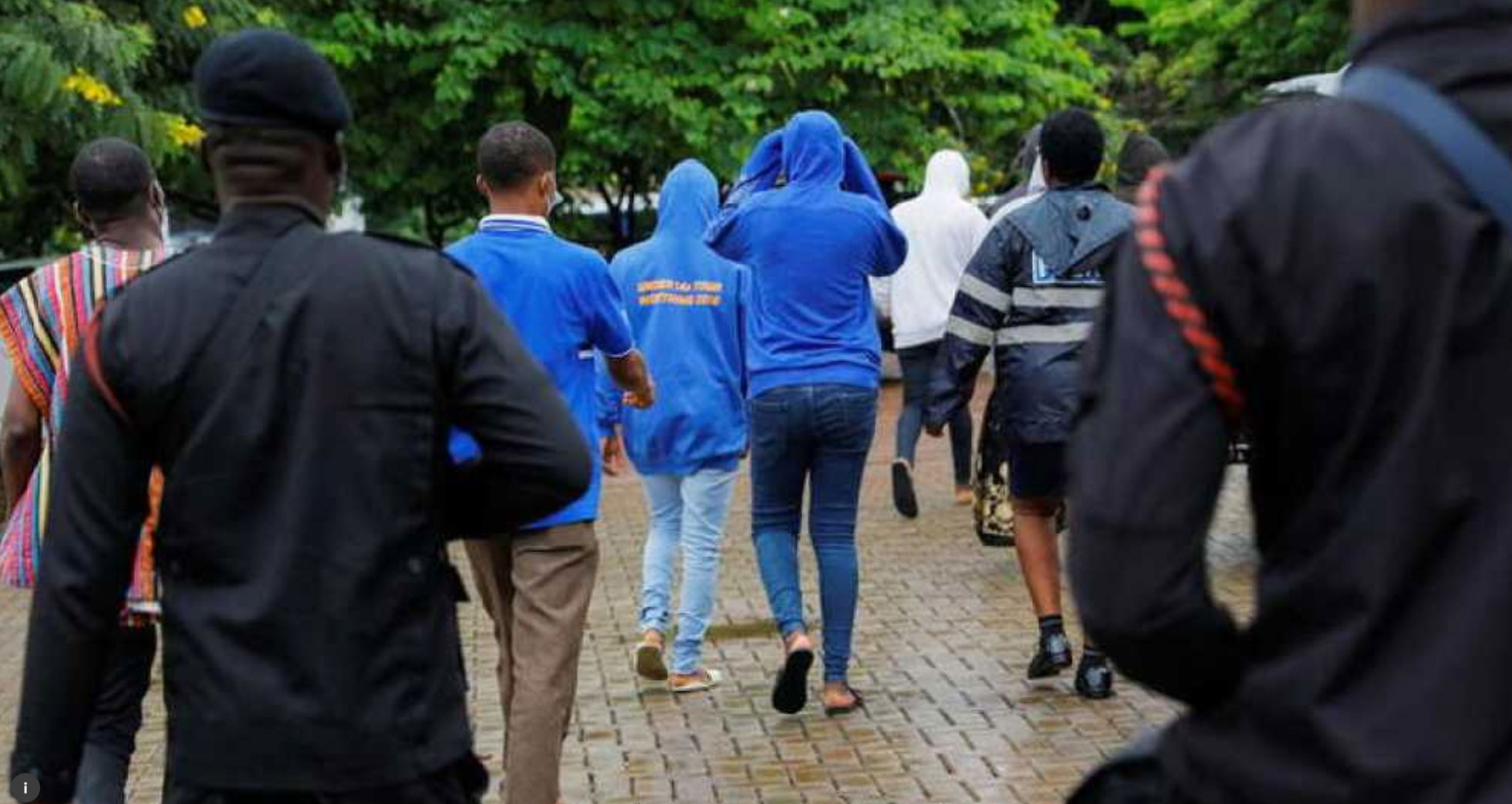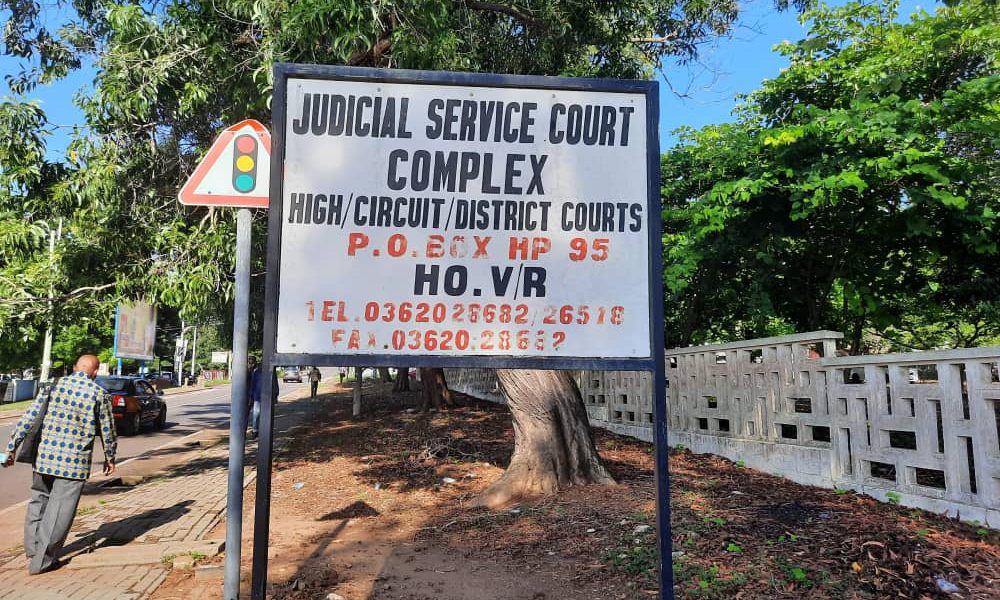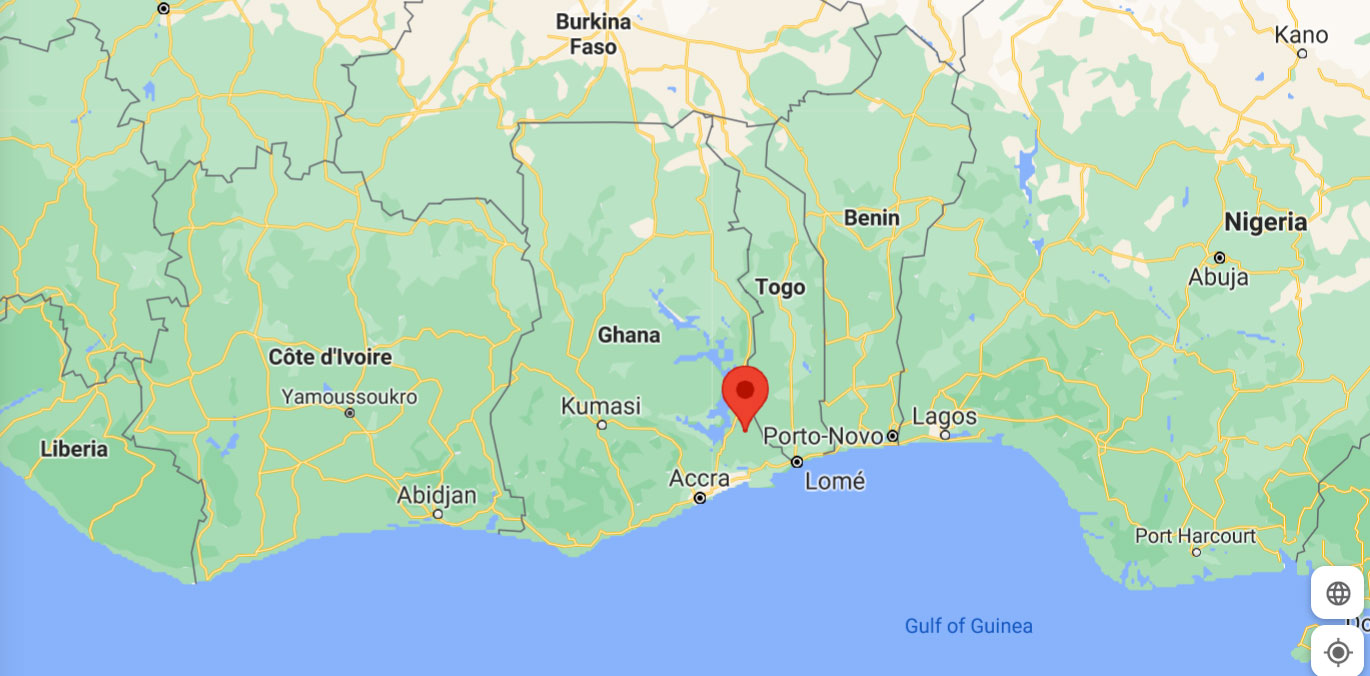A year after the arrest of 21 activists in Ghana, where do we go from here?
LGBTQ rights activist and journalist in Cameroon.
A year after the arrest of 21 human rights activists on homosexuality-related charges in Ho, Ghana, an activist/researcher asks: Where do we go from here? How many more police raids, media witch hunts, family shunning and antagonistic speeches from political and religious leaders might we be subjected to, simply for existing?

Researcher Rita Nketiah authored this reminiscence and analysis of the events of May 2021 for Human Rights Watch:
Ho21 Anniversary: Reflections on State-Sanctioned Violence Against LGBTI Ghanaians
By Rita Nketiah
Thursday, May 20, 2021 (8:30 p.m.)
It is a cool Thursday night. I am sitting at my favorite beach restaurant in Accra. Suddenly, my phone notifications start buzzing. In one of my organizational group chats for lesbian, bisexual, and queer (LBQ*) people in Ghana, the social media account administrators are swiftly removing people without explanation, raising frantic questions among members.
I learn that Lariba, executive director of the LBQ organization OLS, has been arrested in Ho, a southeastern city. I know that she is leading a joint paralegal training session with KWG, a local intersex organization. The group administrator temporarily removes Lariba from the group to protect her from prying police officers, who might use her participation in LBQ social media groups as further “evidence” of a “crime.”
Hours later, we learn that armed police officers invaded the training workshop and arrested 21 participants on suspicion of “unlawful assembly.”
Panic immediately sets in. I lapse into a dark sea of worry for my comrades’ safety. I should be used to this by now. Same sex activity is criminalized and socially stigmatized in Ghana. We live with the daily threat of state and non-state violence.
But this unwarranted invasion reveals how unscrupulous the state can be. The community is already reeling after the LGBT Rights Ghana community space was shut down following a police raid in February and with pronouncements of an impending anti-LGBTI bill in Ghana’s parliament.

Sunday, May 23, 2021 (5:30 a.m.)
Weary-eyed and uncertain, I sit behind the wheel, driving four hours with three other activists as part of the Alliance for Equality and Diversity’s Welfare and Crisis Team to support the detainees. None of us know what to expect when we arrive in Ho. We are guided by activists who had escaped the arrests, just before the police could find them on the premises. We are aware that these individuals are risking future arrest if they are identified and linked to the detainees by someone in public. We move from station to station, inquiring about the whereabouts of the detained activists. At each station, we hope to be met by reasonable police officers who would allow us to visit our colleagues, provide them with toiletries, and arrange for their daily meals.
The police are stern and suspicious, giving us limited time with the detainees, who have been spread across four police stations. We feel the weight of our colleagues’ predicament. Many appear disheveled and fearful, searching for answers in our eyes from cramped and unsanitary cells. We hold back tears as we try to comfort them, pray with them, and frantically write down their requests: this person needs antiretroviral medication, that person needs sanitary pads. Another asks us to tell her son she is “delayed” at a workshop. Others ask us to tell their bosses they cannot attend work for a few days: revealing any more details could potentially out them and risk their employment.
In the following weeks, things intensify as local and diaspora activists provide legal representation, attend court dates, mobilize resources and seek out medications and care packages for the detainees, by now referred to on social media as the “Ho21.” A robust online campaign is launched, with #FreetheHo21 and #Releasethe21 trending on Twitter. There are fundraisers, solidarity statements, petitions, calls to action, and conflicts over strategy as we try to forge new alliances to assist our detained activist comrades.
Most of it is still a blur.
Friday, June 11, 2021
The authorities deny the participants bail four times and detain them for 22 days. Human Rights Watch documents overcrowded cells, filthy bathrooms, and taunts from police officers before the detainees are finally released on bail on June 11.
Monday, August 2, 2021
Charges are dropped because of “insufficient evidence.” But the intense media blitz around the arrests and trial included photographs of those arrested, putting them in the public spotlight and at risk of further stigmatization, harassment, job loss, and family abandonment.

Present day, May 2022
In April, I sat down with three Ho21 detainees to understand how their lives had been affected.
While the charges were eventually dropped, many still battle depression, isolation, and fear due to the scandalized media storm and police mistreatment in cells. M.F., a bisexual mother of two, returned home to an angry husband, who refused her entry and denied access to her children. Today, she is seeking asylum because life in her community has become unbearable. Most of her family members disowned her, her husband has closed her shop, and she no longer attends her community mosque for fear of judgment and ridicule:
“My life has never been the same again, even now. Because I’m [in] hiding … I’ve become something else [in the eyes] of my family. Even some of my friends, that I knew when I was back home, they’ve all changed towards me. The insults I’ve been getting, my husband neglecting me, even my parents. It’s not easy for me…. It’s not easy at all.””
— M.F., Ho21 detainee
For other detainees, the experience has transformed their relationship with activist work. F.S., a student, human rights activist, and non-binary lesbian, told me that she has flashbacks to her arrest and time in prison, affecting her sense of safety:
“Honestly, everything around me has changed, from how people relate to me and vice versa. Mentally, the flashbacks sometimes trigger a lot of isolation in me. [I] cross-check everything about security when I’m at gatherings [now]. I also avoid spaces where the Ho21 will be the main topic.… I’m still healing.”
— F.S., Ho21 detainee
T.H., an intersex person, was stripped naked and tortured in police custody. She says that police officers forcefully examined her genitals, shoved her into a male cell, insisted that she was not a woman and encouraged male prisoners to rape her. Some inmates rushed towards her, though two other inmates stepped in to stop them. Shortly after being released, T.H. fled the country for fear of persecution and a lack of job opportunities due to the hypervisibility of the Ho21 case. T.H. feels fragile, as the stigma, lack of opportunities, and isolation affect her in her new temporary home:
“My life was at risk in Ghana. When [people found out] that I’m part of that 21 arrested in Ho, I had to change my location to another place, I had to run for my life. If this bill passes, [returning to] my life in Ghana will be very difficult for me … because I don’t have any support anywhere.”
— T.H., Ho21 detainee

Where do we go from here?
Ho21 should not have happened. But it changed us forever. It is one example of the violence faced by lesbian, gay, bisexual, transgender, and intersex (LGBTI) people in Ghana, and shows that state actors feel free to violate rights to freedom of assembly, association, and expression, which are protected under international and African human rights law and Ghana’s Constitution. State-sanctioned anti-LGBTI+ violence is likely to worsen if Parliament passes a new “Family Values Bill” aimed at broadly criminalizing LGBTI+ “activity” in Ghana.
Same-sex conduct is already a misdemeanor punishable by up to three years in prison. The bill would lengthen the time to up to five years, it would also outlaw any advocacy based on sexual orientation or gender identity and penalize publishing information considered to encourage homosexuality. The Eighteen-Member Constitutional, Legal and Parliamentary Affairs Committee has already conducted four televised public hearings as part of their review of over one hundred memos from the public responding to the proposed bill.
At this juncture, it is still difficult to say whether the mounting public pressure from religious and cultural groups will determine the passage of the bill. However, many politicians including the current Speaker of Parliament, Honorable Alban Bagbin have shown public support for the bill, calling LGBTQI presence in Ghana “worse than the COVID pandemic”. If passed, this bill threatens the fabric of the LGBTI community, and our efforts to seek liberation.
Instead, Ghana should enforce its constitutional commitment to respect the human rights of all its citizens.
As we mark the anniversary of the Ho21, I wonder: How many more police raids, media witch hunts, family shunning and antagonistic speeches from political and religious leaders might we be subjected to, simply for existing? Where exactly do we go from here?
The author this article, Dr. Rita Nketiah, is a researcher in the Women’s Rights Division and LGBT Rights Program at Human Rights Watch.




